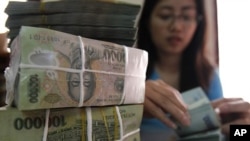Vietnam has devalued its currency for the third time in a year. The dong fell 9.3 percent Friday, bringing the official exchange rate to 20,693 from 18,932 per U.S. dollar.
The central bank says the devaluation is aimed at increasing liquidity in the foreign exchange market and curbing the trade deficit. The dong was last devalued in August.
IMF approval
Benedict Bingham, Vietnam country representative of the International Monetary Fund, says the devaluation is a welcome move as it narrows the gap between the official exchange rate and the market rate.
But he says it has to be supported by other measures that address Vietnam’s bigger economic challenges.
"On the monetary policy side, there needs to be a much more decisive focus on containing inflation and then on fiscal policy, there needs to be a much clearer consolidation path for the budget deficit to give the markets - and I'm talking about domestic and overseas - confidence that public debt can be contained," Bingham said.
Growing deficit
Consumer prices in Vietnam in January rose more than 12 percent. Last year, the economy recorded its fastest growth in three years. But Vietnam posted a $1 billion trade deficit in January -- a problem that has put pressure on its foreign exchange reserves.
International credit rating agencies downgraded Vietnam last December because of worries about the health of its banking sector, capital outflows and weak economic policies. That has made it more expensive for Vietnam to borrow money in the international capital markets.
In addition, some international investors and lenders have become concerned about Vietnam’s prospects after Vinashin, a state-owned shipbuilder, defaulted on $600 million in foreign loans.
Vietnam Devalues Currency as Inflation Bites
- By Heda Bayron




